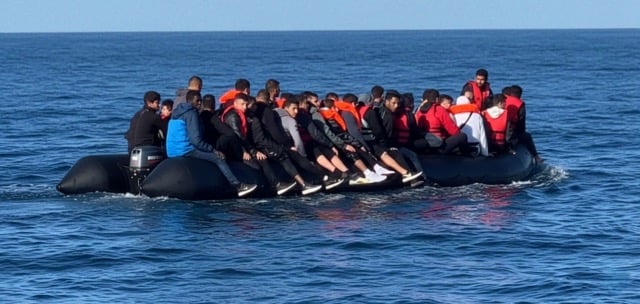France has stepped back from its commitment to intercept migrant boats at sea in the English Channel, according to multiple sources speaking to the BBC, dealing a significant blow to Sir Keir Starmer’s flagship immigration policy.
The revelation comes as Channel crossings reached 36,956 this week, surpassing the entire 2024 total of 36,816 and making 2025 the second-highest year on record. The milestone was reached more than two months earlier than last year.
A figure closely linked to French maritime security dismissed earlier promises of tougher action as “just a political stunt”, adding bluntly: “It’s much blah-blah.” The stark assessment calls into question months of diplomatic negotiations between London and Paris aimed at stemming the dangerous crossings.
Martin Hewitt, commander of Britain’s Border Security Command, has previously expressed frustration at French delays in implementing agreed measures. The policy in question, discussed at July’s UK-France summit between President Emmanuel Macron and the Prime Minister, focused on intercepting so-called “taxi boats” that smuggling gangs use to collect passengers already standing in shallow waters.
French police union spokesman Jean-Pierre Cloez confirmed the interior minister’s earlier proposals were now “on hold. He told the BBC: “We considered at the time it was dangerous. The rules, for the moment, are the same. There’s no change in the way we do things.”
The backtracking appears partly linked to France’s political turbulence. Bruno Retailleau, the former interior minister who championed the aggressive Channel approach, lost his position in recent government reshuffles as France grapples with ongoing political instability.
Peter Walsh, a senior researcher at Oxford University’s Migration Observatory, suggested the promised maritime doctrine changes may never materialise. “It’s possible that might never happen,” he said, highlighting how France’s domestic chaos has derailed cross-border enforcement efforts.
The Labour government’s “one-in-one-out” returns deal with France has proved equally troubled. Just 42 migrants have been sent back to France since the scheme began in August, whilst over 11,000 have arrived during the same period. The arrangement suffered further embarrassment this week when an Iranian man deported to France in September returned to Britain on a small boat within weeks.
Children’s Minister Josh MacAlister insisted the man would be “removed again and again” if necessary, defending the programme as operational despite mounting criticism. The returned migrant told The Guardian he faced exploitation by smuggling gangs in France, saying: “If I had felt that France was safe for me, I would never have returned to the UK.”
Security sources raised practical concerns about maritime interceptions. A marine expert with ties to French authorities acknowledged the Canal de L’Aa near Gravelines was shallow enough for safe intervention, yet noted French naval personnel fear legal liability if migrants die or suffer injuries during operations.
The French navy is against this,” another source told the BBC. “They realise this kind of mission is extremely dangerous and they risk being implicated and ending up in court. It’s going to be a disaster.”
French police unions also cited stretched resources covering over 150 kilometres of coastline, alongside insufficient equipment and training for seaborne operations. Officers fear drowning whilst wearing heavy equipment during water interventions.
In July, the BBC captured rare footage of French gendarmes wading into shallow waters to slash an inflatable boat crowded with migrants. Downing Street hailed the incident as “a significant moment”, suggesting France was adopting tougher tactics. Yet subsequent months have seen no policy changes despite those assurances.
Jean Deldicque, a retired chip shop owner living beside the canal at Gravelines, said he witnessed four boats departing in a single day. He showed reporters videos of police patrol boats circling migrant dinghies without attempting to block their departure. “It’s mad, mad, mad. You have to stop the boats,” he said.
The situation represents a considerable setback for Starmer’s pledge to “smash the gangs” and restore border control. Opposition politicians seized on the developments, with Shadow Home Secretary Chris Philp calling the returns deal “pathetic” and claiming it would take 10 years to deport this year’s arrivals alone.
Despite the setbacks, the Home Office maintained France remained “a critical partner in tackling illegal migration. A spokesman said: “We will do whatever it takes to secure our borders and stop migrants entering the country on small boats. France is a critical partner in tackling illegal migration and we continue to work closely together as they review their Maritime Doctrine, which will allow officers to intervene in shallow waters.”
Britain currently contributes substantial funding under the Sandhurst Treaty, which is being renegotiated for renewal next year. The UK has provided hundreds of millions of pounds to support French coastal patrols and enforcement operations.
Whilst French authorities continue patrolling beaches and intercepting boats on land, the abandonment of promised maritime interventions leaves a critical gap in enforcement. Smuggling gangs have adapted by launching boats from waterways and canals, making land-based interceptions increasingly difficult.
The Channel crossing route remains deadly. At least 73 people died attempting the journey in 2024, more than all previous years combined. Humanitarian organisations have called for safe legal routes rather than security-focused approaches, arguing current policies push desperate people towards ever more dangerous crossings.
With fair weather conditions creating more “red days” suitable for crossings, officials expect numbers to continue rising through autumn. The political pressure on Starmer’s government intensifies as Reform UK, which campaigns on hardline immigration policies, has overtaken Labour in some opinion polls.
The failure to deliver on French cooperation promises raises fundamental questions about Britain’s ability to control Channel migration without fundamental changes to international maritime law or genuine European cooperation beyond bilateral agreements.
Follow for more updates on Britannia Daily



